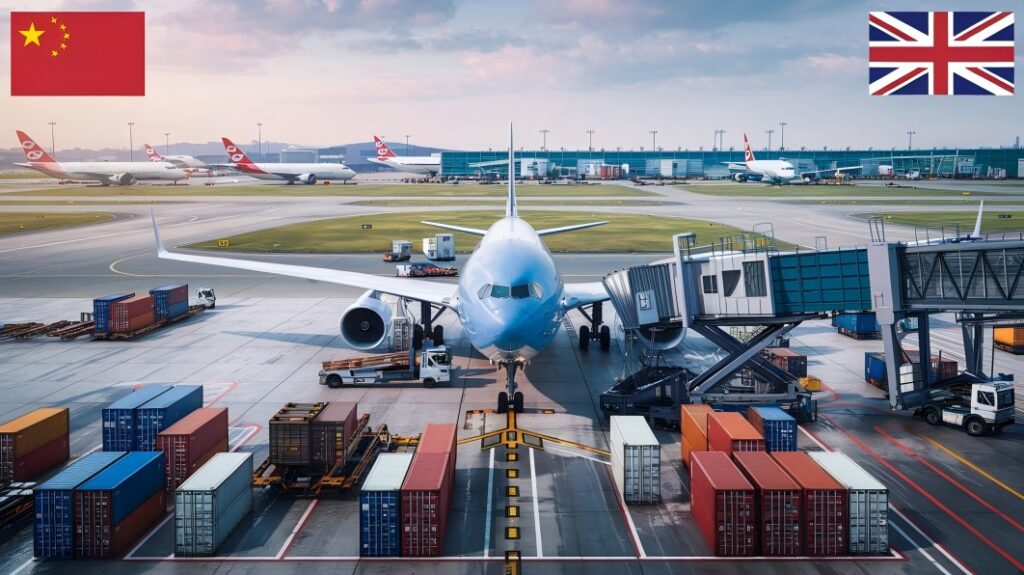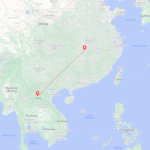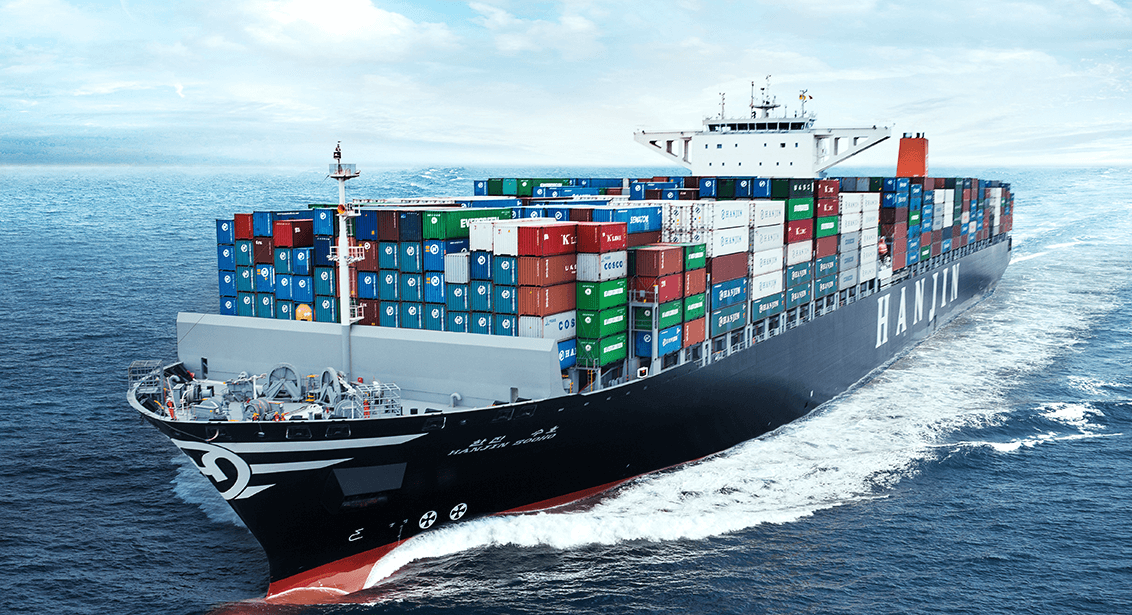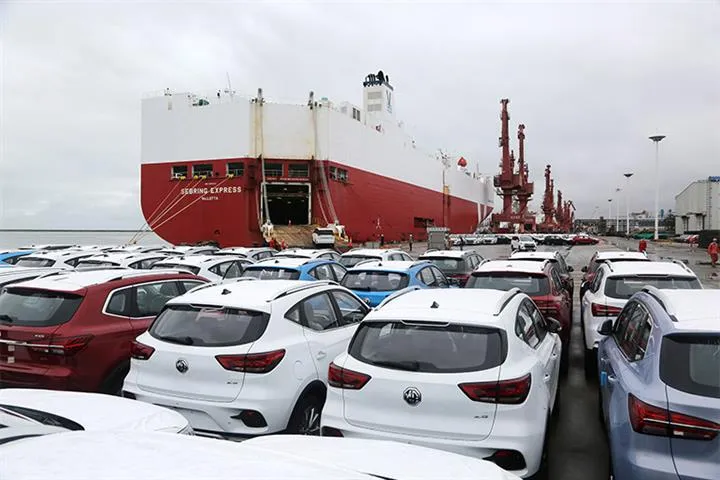In today’s fast-paced global marketplace, air freight has emerged as a crucial transportation mode for businesses looking to import goods from China to the UK. Offering unmatched speed and efficiency, air freight allows companies to move products across vast distances quickly, making it an ideal choice for high-value and time-sensitive shipments. This article explores the numerous benefits, costs, and processes associated with air freight, providing valuable insights for businesses aiming to optimize their import operations from China to the UK.

Introduction to Air Freight from China to the UK
Overview of Air Freight Services
Air freight is a pivotal component of international logistics, particularly for businesses looking to import goods from China to the UK. This mode of transport involves the shipment of goods via aircraft, providing a fast and efficient way to move products across vast distances. Air freight services can be broadly categorized into two types: express and standard services.
- Express Air Freight: This service is designed for urgent shipments requiring rapid delivery, often within 24 to 48 hours. Companies may prefer express shipping for high-value items or time-sensitive products, ensuring they reach their destination without delay.
- Standard Air Freight: This offers a more economical option with longer transit times, typically ranging from 3 to 7 days. Standard air freight is suitable for less urgent shipments where cost savings are prioritized over speed.
Air freight services encompass various logistics processes, including customs clearance, warehouse services, and insurance services, enabling a seamless supply chain experience for businesses.
Importance of Air Freight in International Trade
The significance of air freight in international trade cannot be overstated, especially in the context of global commerce. The ability to quickly transport goods has reshaped supply chain dynamics, fostering increased competitiveness among businesses. Here are a few key reasons why air freight plays a crucial role:
Global Accessibility: Air freight connects remote regions and enhances market access. Businesses can reach customers in disparate geographical locations, strengthening their presence and expanding their customer base.
Inventory Management: The speed of air freight allows businesses to adopt just-in-time inventory strategies. This minimizes the need for large stockpiles, reducing warehousing costs and enhancing cash flow management.
Market Trends Responsiveness: The fast-paced nature of today’s markets necessitates agility. Air freight enables businesses to respond swiftly to changing market demands, introducing new products or replenishing stock as necessary.
High-Value Goods Transport: Air freight is especially beneficial for transporting high-value, low-volume goods, such as electronics or luxury items, where protection and quick delivery are paramount.
Overall, the integration of air freight into supply chain solutions is essential for modern businesses looking to maintain competitive advantages in international markets.
Benefits of Choosing Air Freight
Speed and Efficiency of Air Freight
One of the most compelling arguments in favor of air freight is its unparalleled speed. Compared to other transportation methods, such as ocean freight, air freight can significantly reduce transportation time. For example, while ocean freight may take weeks to deliver goods from China to the UK, air freight can accomplish the same task in just a few days. This efficiency is particularly advantageous for businesses with tight deadlines or urgent shipment needs.
Moreover, advancements in logistics technologies have further optimized air freight operations. Real-time tracking systems allow businesses to monitor their shipments closely, providing visibility and peace of mind. Streamlined processes have also resulted in quicker customs clearance times, reducing delays and making air freight an increasingly efficient option.
Safety and Reliability of Air Transport
Safety and reliability are paramount considerations in any shipping decision. Air freight stands out as one of the safest transport options available, with significantly lower incident rates compared to other modes of transport. Airlines and freight carriers adhere to strict safety regulations and protocols, ensuring that cargo is handled with care and arrives at its destination intact.
Furthermore, the reliability of air transport is bolstered by its ability to circumvent common delays associated with land or sea routes, such as traffic congestion or port congestion. This reliability is crucial for businesses that rely on timely deliveries to maintain customer satisfaction and operational efficiency.
Ideal Cargo Types for Air Freight
Not all cargo is suited for air transport, but certain categories benefit immensely from this method. The following types of goods are ideal candidates for air freight:
| Cargo Type | Description |
|---|---|
| High-Value Products | Items like electronics, jewelry, and luxury goods that require quick delivery. |
| Perishable Goods | Fresh produce, pharmaceuticals, and other temperature-sensitive items that must arrive quickly to maintain quality. |
| Time-Sensitive Cargo | Urgent documents or specialized equipment, where speed is crucial for business operations. |
| Lightweight Items | Smaller, high-value items that can be easily transported. |
Choosing air freight for these types of cargo can lead to enhanced customer satisfaction and more efficient inventory management.
For businesses looking to leverage the advantages of air freight, Dantful International Logistics offers a comprehensive range of services tailored to meet your logistics needs. With expertise in air freight, we provide cost-effective and high-quality solutions to ensure your goods arrive safely and on time. Explore our offerings today, and let’s facilitate your imports from China to the UK seamlessly.
Read More:
- Shipping From China To Netherlands
- Shipping From China To Spain
- Shipping From China To Germany
- Shipping From China To France
- Shipping From China to Italy
- Shipping From China To Poland
- Shipping From China to United Kingdom
Understanding Air Freight Costs
Factors Affecting Air Freight Pricing
When considering air freight as a solution for importing goods from China to the UK, it’s essential to understand the various factors that influence air freight pricing. These factors include:
Weight and Volume: Air freight costs are typically calculated based on the greater of actual weight or dimensional weight. Dimensional weight is determined by the cargo’s volume and a specific dimensional factor set by the airline. This means that even lightweight cargo can incur higher costs if it occupies a large space.
Distance: The distance between the departure and destination airports significantly impacts the overall cost. Longer distances generally result in higher shipping charges due to the increased fuel and operational costs incurred by the airline.
Type of Cargo: Certain types of cargo may attract additional charges. For example, hazardous materials or perishables often require special handling, which can elevate costs. Additionally, high-value goods may incur insurance costs that affect the overall pricing structure.
Seasonality: Demand fluctuations during peak seasons can lead to increased air freight rates. For instance, shipping around the holidays typically sees a surge in demand, resulting in higher prices due to limited capacity.
Service Level: Premium services such as express air freight will command a higher price compared to standard services. Businesses must assess their urgency and choose a service that aligns with their budget and needs.
Average Cost per Kilogram for Air Shipments
The average cost for air shipments from China to the UK can vary significantly based on the factors mentioned above. However, as of recent data, the typical air freight rates range from approximately £4 to £10 per kilogram. This fluctuating rate reflects the current market dynamics, air carrier pricing strategies, and the specific requirements of the shipment.
| Service Type | Average Cost per Kilogram |
|---|---|
| Standard Air Freight | £4 – £6 |
| Express Air Freight | £6 – £10 |
It’s worth noting that these prices are subject to change, and businesses should request quotes from freight forwarders like Dantful International Logistics to get accurate and up-to-date pricing for their specific shipments.
Comparison of Air Freight vs. Sea Freight Costs
While air freight offers speed and efficiency, sea freight remains a more economical option for many businesses, especially for larger volumes or less time-sensitive shipments. Below is a comparative analysis of typical costs associated with each method:
| Shipping Method | Average Cost per Kilogram | Transit Time |
|---|---|---|
| Air Freight | £4 – £10 | 3 to 7 days |
| Sea Freight | £0.5 – £3 | 20 to 40 days |
This comparison illustrates the critical trade-off between cost and speed. For businesses that require quick deliveries, air freight presents a compelling choice despite the higher costs. Conversely, for those with more flexibility in delivery timelines, sea freight can provide substantial savings.
Shipping Process for Air Freight from China to the UK
Step-by-Step Guide to Air Freight Shipping
Understanding the shipping process for air freight from China to the UK is crucial for businesses aiming to streamline their logistics. Here’s a detailed step-by-step guide to facilitate a smooth air cargo shipment:
Select a Freight Forwarder: Partnering with a reliable freight forwarder, such as Dantful, is essential. They can assist with quotes, booking flights, and managing customs documentation.
Prepare Your Goods: Ensure that your goods are properly packaged to withstand air transport. Considerations include securing fragile items and choosing appropriate packaging for perishables.
Documentation: Compile necessary documentation, including commercial invoices, packing lists, and any applicable licenses. Proper documentation is critical for customs clearance.
Customs Clearance: Your freight forwarder will handle customs clearance, ensuring compliance with regulations and minimizing delays. This includes filing the Import Declaration and paying applicable duties and taxes.
Transport to Airport: Arrange for transportation of goods to the airport. Your freight forwarder can assist with this process, ensuring timely delivery to the departure airport.
Loading and Shipping: Once at the airport, your cargo will be loaded onto the aircraft for transport. The freight forwarder will provide you with tracking information to monitor your shipment throughout its journey.
Arrival and Customs Clearance in the UK: Upon arrival at the destination airport, your shipment will undergo customs clearance before release. Your freight forwarder will coordinate this step, ensuring compliance with UK regulations.
Delivery to Final Destination: Once cleared, you can arrange for either door-to-door delivery or pickup from the airport, depending on your needs.
Delivery Options: Door-to-Door vs. Port-to-Port
Businesses must consider their delivery options when importing goods via air freight. Here’s a breakdown of the two primary delivery methods:
Door-to-Door Delivery: This service provides the utmost convenience, as it involves the freight forwarder managing all logistics from the supplier’s location in China to the final destination in the UK. This option is ideal for businesses seeking a hassle-free experience, as it encompasses all transport, customs clearance, and delivery to the designated location.
Port-to-Port Delivery: This method is more cost-effective and suitable for businesses with their own logistics arrangements in the UK. With this option, the shipment is transported from the departure airport in China to the designated airport in the UK, where the recipient is responsible for clearing customs and arranging local delivery.
Choosing the appropriate delivery method depends on your business’s logistics capabilities, budget, and urgency. For a comprehensive logistics solution tailored to your needs, Dantful International Logistics can provide expert guidance and support throughout the shipping process.
You may be interested in the following related articles:
- Shipping From China To Ireland
- Shipping From China To Norway
- Shipping From China to Turkey
- Shipping From China To Finland
- Shipping From China To Sweden
Key Airports for Air Freight Between China and the UK

Major Departure Airports in China
When importing goods from China to the UK, knowing the major departure airports is crucial for efficient logistics planning. The primary airports that facilitate air freight operations in China include:
Beijing Capital International Airport (PEK): As one of the busiest airports in the world, PEK serves as a significant hub for international air freight. Its extensive network of routes connects to numerous global destinations, including the UK.
Shanghai Pudong International Airport (PVG): PVG is a leading airport for cargo traffic in China, offering direct flights to various UK airports. The airport has advanced facilities to handle high volumes of air freight, making it a popular choice for shippers.
Guangzhou Baiyun International Airport (CAN): Located in southern China, CAN is another vital air freight hub. The airport provides a range of international connections, facilitating efficient shipping to the UK.
Shenzhen Bao’an International Airport (SZX): Known for its strategic location near Hong Kong, SZX handles a significant amount of cargo traffic, particularly for electronics and machinery. Its proximity to manufacturing centers makes it a preferred departure point for many shippers.
Chengdu Shuangliu International Airport (CTU): As a growing air freight hub in western China, CTU offers essential connections for businesses wanting to ship products to the UK. This airport has expanded its international cargo capacity in recent years.
These airports are integral to the air freight network and provide diverse service options for businesses looking to import goods into the UK efficiently.
Key Arrival Airports in the UK
Upon arrival in the UK, several major airports facilitate the processing and distribution of air freight. The key arrival airports include:
London Heathrow Airport (LHR): As the largest and busiest airport in the UK, LHR serves as a primary entry point for air freight from China. It offers extensive customs facilities and is well-connected to the rest of the country via road and rail.
London Gatwick Airport (LGW): LGW is another significant airport for air freight, providing direct services to various destinations in China. Its efficient handling capabilities make it a viable alternative to Heathrow for certain cargo shipments.
Manchester Airport (MAN): Serving the North of England, MAN has become an increasingly important hub for international air freight. It connects to several Chinese airports and offers a range of cargo services.
Birmingham Airport (BHX): BHX is another key airport in the UK, facilitating cargo shipments into the Midlands region. The airport has expanded its air freight operations to accommodate growing demand.
Edinburgh Airport (EDI): While primarily a passenger airport, EDI has seen growth in air freight activity, particularly for perishable and high-value goods. It provides essential connections for businesses in Scotland.
Understanding these key arrival and departure airports is essential for optimizing logistics and ensuring smooth operations in the air freight process between China and the UK.
Transit Times for Air Freight from China to the UK
Typical Delivery Times for Different Services
Transit times for air freight shipments from China to the UK can vary based on the service level chosen. Here’s an overview of typical delivery times:
| Service Type | Typical Delivery Time |
|---|---|
| Express Air Freight | 1 to 3 days |
| Standard Air Freight | 3 to 7 days |
| Economy Air Freight | 7 to 10 days |
Express air freight is ideal for urgent shipments, providing the fastest delivery times, often within 24 to 48 hours. This service is particularly beneficial for high-value items or time-sensitive products.
Standard air freight balances speed and cost, making it suitable for less urgent shipments that still require timely delivery. This option typically takes a few days longer than express services.
Economy air freight is the most cost-effective option, taking longer while still providing the reliability of air transport. Businesses often choose this service for bulk shipments or when time is less critical.
Factors Influencing Transit Times
Several factors can influence transit times for air freight from China to the UK, including:
Flight Schedules: Availability of direct flights can impact delivery times. Any delays in flight schedules can extend transit time, particularly if a shipment requires transit through multiple airports.
Customs Clearance: Efficient customs clearance is essential for timely delivery. Delays in documentation, inspections, or processing can lead to longer transit times. Engaging a proficient freight forwarder, such as Dantful International Logistics, can help minimize customs clearance delays.
Weather Conditions: Adverse weather can disrupt flight schedules and lead to delays. Seasonal weather patterns, such as monsoon or winter storms, may impact air freight operations.
Cargo Handling: The speed and efficiency of cargo handling at both departure and arrival airports can influence transit times. Well-equipped airports and experienced ground handling services can expedite the process.
Peak Seasons: During peak shipping seasons, such as the holiday period, increased demand for air freight can lead to longer transit times. Businesses should plan accordingly and consider booking shipments well in advance during these times.
By understanding these factors, businesses can better manage their expectations regarding transit times and optimize their logistics operations when importing goods from China to the UK. For efficient and reliable shipping solutions, Dantful International Logistics remains a trusted partner in navigating air freight logistics.
Challenges in Air Freight Shipping
Air freight shipping, while efficient and beneficial for many businesses, does come with its set of challenges. Understanding these obstacles can help companies navigate the complexities of international shipping from China to the UK.
1. Capacity Constraints
Airlines often experience capacity constraints, particularly during peak shipping seasons or due to unforeseen events like pandemics. Limited cargo space can lead to higher prices and the potential for delays in shipping schedules. Businesses must be prepared for these fluctuations in availability and consider alternate shipping options if necessary.
2. Regulatory Compliance
Navigating the various regulatory requirements for air freight can be a complex task. Each country has its own customs regulations, documentation requirements, and import duties that must be adhered to. Failure to comply with these regulations can result in delays, fines, or even confiscation of goods. Engaging with a knowledgeable freight forwarder, such as Dantful International Logistics, can simplify this process.
3. Fluctuating Costs
Air freight costs can vary significantly based on market conditions, fuel prices, and demand. These fluctuations can impact budgeting and financial forecasting for businesses relying on air transport. Companies should remain agile and explore various pricing options with their freight forwarders to mitigate unexpected cost increases.
4. Security Concerns
The security of cargo during transit is a significant concern in air freight. Items can be subject to theft, damage, or loss while in transit. Ensuring that high-value items are properly insured and that robust security measures are in place can help reduce these risks.
5. Environmental Impact
Air freight has a higher carbon footprint compared to other transportation methods, such as sea freight. Increasingly, consumers and companies are placing importance on sustainability. Businesses may need to explore ways to offset their carbon emissions or consider more eco-friendly alternatives, even if it means sacrificing some speed.
Being aware of these challenges will help businesses prepare effectively for air freight shipping and minimize potential disruptions in their supply chain.
Tips for Successful Air Freight Shipping from China to the UK
Navigating air freight shipping can be a seamless experience with proper planning and execution. Here are some tips to ensure successful air freight operations:
Choosing the Right Freight Forwarder
Selecting a reliable freight forwarder is crucial for successful air freight shipping. Here are key factors to consider:
Experience and Expertise: Choose a forwarder with experience in air freight and a solid understanding of the shipping routes between China and the UK. Their expertise in customs clearance and local regulations will ensure compliance and smooth operations.
Network and Connections: A well-connected freight forwarder can navigate potential capacity constraints and find the best available rates and routes.
Transparent Pricing: Look for a forwarder who provides clear and transparent pricing without hidden fees. Understanding the total cost upfront will aid in budgeting.
Customer Service: Opt for a forwarder known for strong customer support. This includes timely updates and communication throughout the shipping process.
Packaging Best Practices for Air Transport
Proper packaging is key to ensuring the safe transport of goods via air freight. Consider the following best practices:
Use Lightweight Materials: Opt for packaging materials that are lightweight but durable. This helps minimize shipping costs while ensuring protection.
Secure Fragile Items: Use cushioning materials, such as bubble wrap or foam, to protect fragile items from damage during transit. Clearly label packages containing fragile contents.
Adhere to Regulations: Each airline has specific packaging requirements, especially for hazardous materials. Ensure compliance with these regulations to avoid delays or rejections.
Labeling: Ensure that all packages are clearly labeled with relevant information, including the destination address, contact information, and handling instructions.
Tracking Your Shipment Effectively
Effective shipment tracking is vital for monitoring the status of your goods in transit. Here’s how to keep track effectively:
Real-Time Tracking Systems: Choose a freight forwarder who offers real-time tracking solutions. This allows you to monitor the status of your shipment at every stage of the journey.
Regular Updates: Request regular updates from your freight forwarder regarding your shipment’s progress. This can help you anticipate any potential delays or issues.
Communication Channels: Establish clear communication channels with your freight forwarder. Whether through email, phone, or an online portal, effective communication will ensure you stay informed throughout the shipping process.
Implementing these tips will enhance your air freight shipping experience, ensuring that your goods move smoothly from China to the UK. For businesses seeking a reliable partner in air freight logistics, Dantful International Logistics provides comprehensive solutions, enabling efficient and cost-effective shipping tailored to your specific needs.

Young Chiu is a seasoned logistics expert with over 15 years of experience in international freight forwarding and supply chain management. As CEO of Dantful International Logistics, Young is dedicated to providing valuable insights and practical advice to businesses navigating the complexities of global shipping.





















 Afrikaans
Afrikaans Shqip
Shqip አማርኛ
አማርኛ العربية
العربية Հայերեն
Հայերեն Azərbaycan dili
Azərbaycan dili Euskara
Euskara Беларуская мова
Беларуская мова বাংলা
বাংলা Bosanski
Bosanski Български
Български Català
Català Cebuano
Cebuano Chichewa
Chichewa 简体中文
简体中文 繁體中文
繁體中文 Corsu
Corsu Hrvatski
Hrvatski Čeština
Čeština Dansk
Dansk Nederlands
Nederlands English
English Esperanto
Esperanto Eesti
Eesti Filipino
Filipino Suomi
Suomi Français
Français Galego
Galego ქართული
ქართული Deutsch
Deutsch Ελληνικά
Ελληνικά Kreyol ayisyen
Kreyol ayisyen Harshen Hausa
Harshen Hausa Ōlelo Hawaiʻi
Ōlelo Hawaiʻi עִבְרִית
עִבְרִית हिन्दी
हिन्दी Hmong
Hmong Magyar
Magyar Íslenska
Íslenska Igbo
Igbo Bahasa Indonesia
Bahasa Indonesia Gaeilge
Gaeilge Italiano
Italiano 日本語
日本語 Basa Jawa
Basa Jawa ಕನ್ನಡ
ಕನ್ನಡ Қазақ тілі
Қазақ тілі ភាសាខ្មែរ
ភាសាខ្មែរ 한국어
한국어 كوردی
كوردی Кыргызча
Кыргызча ພາສາລາວ
ພາສາລາວ Latin
Latin Latviešu valoda
Latviešu valoda Lietuvių kalba
Lietuvių kalba Lëtzebuergesch
Lëtzebuergesch Македонски јазик
Македонски јазик Malagasy
Malagasy Bahasa Melayu
Bahasa Melayu മലയാളം
മലയാളം Maltese
Maltese Te Reo Māori
Te Reo Māori मराठी
मराठी Монгол
Монгол ဗမာစာ
ဗမာစာ नेपाली
नेपाली Norsk bokmål
Norsk bokmål پښتو
پښتو فارسی
فارسی Polski
Polski Português
Português ਪੰਜਾਬੀ
ਪੰਜਾਬੀ Română
Română Русский
Русский Samoan
Samoan Gàidhlig
Gàidhlig Српски језик
Српски језик Sesotho
Sesotho Shona
Shona سنڌي
سنڌي සිංහල
සිංහල Slovenčina
Slovenčina Slovenščina
Slovenščina Afsoomaali
Afsoomaali Español
Español Basa Sunda
Basa Sunda Kiswahili
Kiswahili Svenska
Svenska Тоҷикӣ
Тоҷикӣ தமிழ்
தமிழ் తెలుగు
తెలుగు ไทย
ไทย Türkçe
Türkçe Українська
Українська اردو
اردو O‘zbekcha
O‘zbekcha Tiếng Việt
Tiếng Việt Cymraeg
Cymraeg יידיש
יידיש Yorùbá
Yorùbá Zulu
Zulu